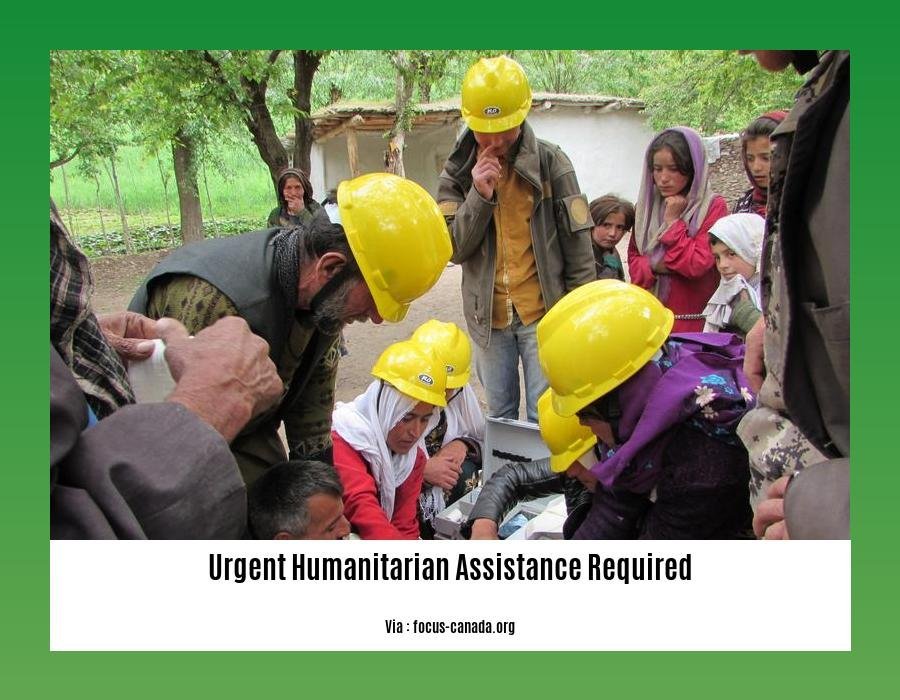Urgent Humanitarian Assistance Required for Crisis-Stricken Regions. As the world faces a growing number of humanitarian crises, there is an urgent need for assistance to provide aid and support to those affected. This article highlights the critical need for humanitarian assistance in crisis-stricken regions, emphasizing the importance of immediate action to save lives and alleviate suffering.
Key Takeaways:

Massive Need: In 2024, approximately 300 million people worldwide will urgently require humanitarian assistance due to conflicts, disasters, and other emergencies.
Highest Need: East and Southern Africa faces the greatest need, with over 74 million people requiring aid.
West and Central Africa Funding Gap: The UN faces a funding shortfall of $7.6 billion for humanitarian assistance in West and Central Africa, where over 32 million people need help.
Urgent Humanitarian Assistance Required
Urgent humanitarian assistance is required for millions of people around the world who are affected by conflict, natural disasters, and other crises. These crises can have a devastating impact on communities, causing widespread suffering and loss of life.
The need for urgent humanitarian assistance is growing. In 2024, nearly 300 million people worldwide will require humanitarian assistance due to conflicts, climate emergencies, and other factors. East and Southern Africa will have the highest need, with 74.1 million people requiring assistance.
The United Nations estimates a funding shortfall of $7.6 billion for humanitarian aid in West and Central Africa to help 32.3 million people. This funding is critical to providing food, water, shelter, medical care, and other essential services to those in need.
How can you help?
There are many ways to help provide urgent humanitarian assistance. You can donate money to humanitarian organizations, volunteer your time, or donate supplies. Every little bit helps.
Here are some ways you can help:
- Donate money to a humanitarian organization that is working in crisis-stricken regions.
- Volunteer your time to help with humanitarian efforts.
- Donate supplies, such as food, water, and medical supplies, to a local collection drive.
- Spread the word about the need for urgent humanitarian assistance.
Thank you for your support.
Attention! Humanitarian Crises Needing Intervention are prevalent worldwide, demanding immediate action. From dire situations requiring relief efforts to global emergencies demanding aid response, we can’t turn a blind eye. Click on the hyperlinks below to learn more about these pressing issues and how we can provide aid:
- Humanitarian crises needing intervention
- Dire situations requiring relief efforts
- Global emergencies demanding aid response
Call to action for public to donate or volunteer
Every day, millions worldwide suffer from crises and disasters, desperately in need of urgent humanitarian assistance. You can make a difference.
Key Takeaways:
- Immediate action is needed: Millions globally require humanitarian aid due to conflicts and disasters.
- Growing demand for assistance: The number of people in need is rising, with an estimated 300 million requiring aid in 2024.
- Africa faces the greatest need: East and Southern Africa have the most significant requirement, with 74.1 million individuals needing assistance.
- Funding gap in West and Central Africa: The United Nations estimates a $7.6 billion shortfall in funding for humanitarian efforts in this region.
- You can help: Donate money, your time, or much-needed supplies.
Take Action:
- Donate to reputable humanitarian organizations to provide life-saving aid to those in need.
- Volunteer your time to support aid efforts, from distributing supplies to providing psychosocial support.
- Organize donation drives in your community to collect essential items such as food, water, and medical supplies.
Together, we can alleviate suffering and provide hope to those who need it most.
Contact information for organizations providing assistance
As you contemplate extending a helping hand during these trying times, here are some trusted organizations that are actively engaged in providing humanitarian aid to those in dire need:
Key Takeaways:
- USAID is the primary U.S. government agency responsible for humanitarian assistance worldwide.
- The International Committee of the Red Cross (ICRC) plays a crucial role in protecting individuals affected by armed conflicts.
- Contacting these organizations directly is the most effective way to provide support for their life-saving efforts.
Contact information:
- USAID:
- ICRC:
Human toll of the crisis
Millions worldwide face desperate circumstances due to conflict and natural disasters, with Haiti facing a particularly dire humanitarian crisis. The human toll of the crisis is catastrophic: families torn apart, livelihoods destroyed, and basic necessities like food and shelter becoming scarce.
The urgent need:
- Emergency supplies: food, shelter, and medical care
- Protection for vulnerable populations
- Funding and support for humanitarian organizations
The international community must mobilize resources and provide immediate assistance to alleviate the suffering in Haiti and other crisis-stricken regions.
Key Takeaways:
- Haiti is facing a severe humanitarian crisis due to escalated violence and poverty.
- Millions worldwide require urgent humanitarian assistance.
- The international community must provide emergency aid and support long-term recovery.
Citation:
- Plan International. “Urgent assistance needed in Haiti to save lives.” May 4, 2023.











